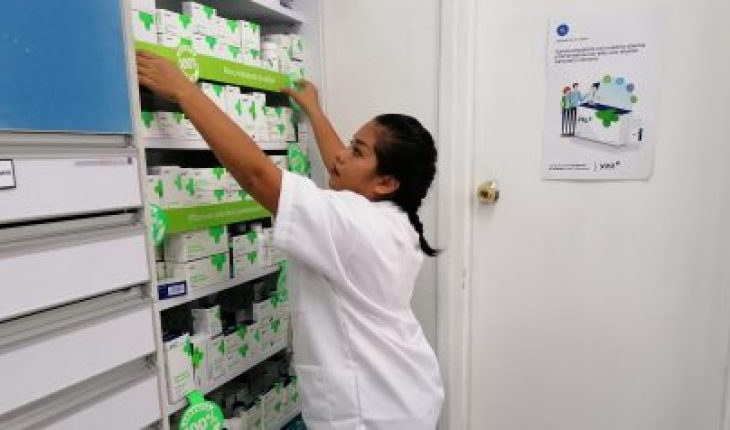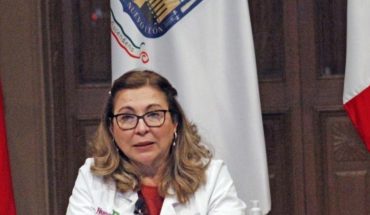Fill the cold room, put the coffee in, clean, tend the box. Mari receives smiling and in good spirits those who enter this OXXO, in Monterrey. The Cuban accent is unmistakable. One morning in October 2019, she left her home in Havana fleeing death threats against her and her family.
His original idea was to travel to the United States, along with his two sons, to meet his cousins, there, and start a new life. Having practiced law for 30 years, in Cuba, starting from scratch in a different country was difficult for him.
In 2014, Mexico received on average 2,000 applications for recognition of refugee status at the Mexican Refugee Aid Commission (COMAR). In 2019, the number amounted to 70 thousand applications. Mari’s application was part of those.
When she arrived in Tapachula, Chiapas, she told her story and applied for refugee recognition from the Mexican government. He initiated an accompanying process with representatives of the UN Refugee Agency (UNHCR) to provide him with the services to which he was entitled on his condition. One of the most important: decent work.
UNHCR’s Durable Solutions Officer, a unit coordinating the local refugee integration programme, explains that, in 2016, together with the International Labour Organization (ILO), a study was conducted on applicants in Mexico and identified as having a “highly compatible” profile with the needs of the Mexican labour market, particularly in the northern and central cities of the country , where there is a higher chance of employment.
Thus, the idea arose to relocate and integrate refugees into states with greater opportunities for employability. This is how Mari traveled from Tapachula, Chiapas, to settle in Monterrey, Nuevo León.
“We did not relocate refugees to populations where they would be competing for employment with the local population. Studies are being done to identify where labour is lacking, where companies report a high level of staff turnover, and public services—such as health and education—have the capacity to absorb to receive arriving people. Safety is also assessed, because they are people who have been fleeing violence in their home communities and being in a safe environment is very important to them,” explains Hepfner.
Reintegration allows 6 out of 10 refugee families out of poverty in less than a year. The remaining four families also make it possible, although it takes longer. UNHCR’s reintegration programmes, in synergy with authorities, private initiative and other local actors, have shown that refugees are highly committed to employment, with good professional performance and expectations of growth within companies, so job dropout is very low.
“There is an explanation for that as well (the high commitment to employment) which is the difference between a migrant who has had the time to plan his or her migration movement and a refugee who has been fleeing a situation of violence. In many cases they are people who decided to leave their countries of origin overnight, in the face of a threat that was about to materialize. Many people are waiting in the early morning. They close the door and leave. They don’t have time to sell their belongings or apply for a loan. Or resort to solidarity from family or friends. They are people who can only get ahead with work in host communities,” says the UNHCR official.
The Economic Commission for Latin America and the Caribbean (ECLAC) estimates that, for Mexico, in 2019, the active participation of refugees in the labour market meant a collection of 40 million pesos for employer contributions and income taxes (ISRs) and payroll.
“At the beginning of the program, it was thought that moving a shelter applicant from Tapachula to Saltillo would only lead to their migration to the United States. It wasn’t,” says the UNHCR Officer. It turns out that 86% (9 out of every 10 families relocated) stayed and had a very successful integration process. While 10% left the program, but to move to other cities within Mexico, where they had support networks or family or other job opportunities.
In 2020, UNHCR accompanied 7,000 refugees in its adaptation process, more than 200 of whom worked at FEMSA, on a program they started with OXXO stores and has been successful. He explains that the rate of permanence of these employees has been important for the company, because in addition to the benefits that their cultural diversity contributes to the organization, its inclusion contributes to the development of the country.
When entering an OXXO store or a group service station — called OXXO GAS – the inclusion stories are very diverse, ranging from people with disabilities, older adults, among other vulnerable groups. A case peeks out of the windshield that’s clean, having cleared gasoline, a 42-year-old Mexican woman, Brenda Medrano, who is head of the household and her income, depends on her children.
“It has been important to me that OXXO GAS has hired me, because several things have changed in my life. When I came in, they helped me a lot. Before, I worked in restaurants and factories, but I decided to ask for a job at a gas station. I came to a station to ask for work, they asked me for my stationery and then they hired me. The training has been good from the time I walked in to right now,” says Brenda.
The National Council to Prevent Discrimination (CONAPRED) has identified at least 11 groups that have traditionally lived in inequality and discrimination as older adults, Afro-Mexicans, religious diversity, ethnicities, migrants and refugees, women, children, people with disabilities, people with HIV/AIDS, youth and people in the LGBT+ community. In recent years, FEMSA has open lines of action to accommodate them.
FEMSA, a company that promotes diversity
Myriam Esther Balam has 11 years of working at FEMSA Comercio and is an indigenous woman of the Maya ethnic group. The job opportunity he received more than a decade ago has allowed him to become manager of this branch of YZA Pharmacies, in the municipality of Chemax, Yucatan.
“When I graduated from high school, I wanted to contribute income to my family, because it was the largest. Since there was no branch of YZA Pharmacies, in Chemax, at the time, when I was hired I was sent to a three-week training, in Merida. They tell me I’m lucky to work here and that’s how I feel, because I came in as a cashier and now I’m a manager,” Esther says.
In Mexico, Myriam’s status in rural areas in the south of the country– where the highest levels of poverty are recorded – results in a lack of access to basic rights. In fact, indigenous participation within the Economically Active Population is 45%, or only 4 out of 10 indigenous speakers have formal work. Of those, 3 will be men and 1, woman.
Anabel Olivas, Coordinator of Inclusion and Diversity at FEMSA Comercio – a business unit at FEMSA that brings together its OXXO store chain, OXXO GAS stations and YZA Pharmacies – explains that inclusion and diversity are strategic and fundamental pillars for business growth and sustainability. “Through inclusion is that we can be ourselves, be authentic and from that condition, bring the best of us to the organization and therefore to society. Inclusion is what allows us to recognize and enrich ourselves from the value of the diversity of views, perspectives, cultures and experiences that reflect who we are and where we come from.”
“Diversity is all of us,” he says. We are aware that we are a company formed by the diversity of our employees and this allows us to innovate to improve the value offer and shopping experience of customers who visit us daily. As we continue to promote diversity, we will continue to evolve the way we work and seek to generate social value in the communities where we operate.
Currently, FEMSA works to facilitate and maximize access to job and development opportunities for diversity that, because of the systemic barriers of inequality and discrimination in the country, usually face more difficulties in obtaining decent employment and growing in a company,” Olivas explains.
Through their labor inclusion strategy, FEMSA Comercio’s business units provide employment opportunities for persons with disabilities, older adults, refugees, young people with no work experience, heads of households, people from indigenous communities, among other minorities, groups in situations of inequality and/or vulnerability.
These groups usually face greater obstacles, but also ,as they are constantly facing and challenging them), they become a very competitive and attractive profile for companies, as they develop skills and values such as resilience, adaptability and empathy, which, in the face of today’s challenges, are much needed for organizations. In addition, they have shown us a high degree of belonging and permanence in employment as they value and care for every opportunity.
“It is through employment, a way in which we can contribute directly so that vulnerable people can get out of this condition. As employers, we have a responsibility to generate clear and effective actions that facilitate and bring closer opportunities for decent employment and growth in equity and equality,” Olivas explains.
It warns that, “In order to achieve labour inclusion, it is important to generate empathy by raising awareness of the contexts of people in vulnerable situations. Recognizing biases and prejudices for lack of information, we will be able to remove systemic barriers,” he replies.
“Companies must design our processes comprehensively and inclusively. It is not enough to invite a person with a disability or a refugee to work, we must consider their full context and ask them how they could do their work better in order to offer them attractive proposals, with inclusive spaces and tools that allow them to remain themselves and contribute their talent,” adds Olivas.
Working with various institutions such as Monterrey Technology and organizations such as UNHCR has been a key part of the strategy to identify synergies for inclusion, such as the refugee reintegration programme. Such inclusion experiences can serve as an example to expand such programmes to other vulnerable sectors of society, such as people who have been displaced from their places of origin by violence and/or organized crime.
The interviewees agree that much remains to be done in terms of job inclusion; however, awareness-raising and articulation of efforts is essential to continue to promote inclusion and diversity in the country.
Receive constant training to manage inventory systems. Be trained to provide customer service. Have personnel management skills. Myriam narrates smiling and in good spirits his experience working in YZA Pharmacies. The Yucatecan accent is unmistakable. “Dyos bo’otik tu yo’olal u páajtalil ts’aab teena”, thanks Maya for the opportunity of work that has allowed her to have a dignified life with her husband and two children.
A space for all
Clemente Rodríguez Esquivel is 54 years old. He would still be 11 years old to consider himself an older adult, however, he failed to find employment “by age,” as he says.
After leaving the company where he previously worked, Clemente applied for work at several companies, without success. He decided to operate a taxi, but his situation didn’t improve. Now, he attends a gas station in Nuevo León, where his recruitment and training process was agile and simple, he recalls. “OXXO GAS offers good opportunities and benefits for big people,” he says.
The disrecognise of human resources areas is the main barrier to promoting the employment inclusion of groups that specialists call “historically discriminated against”. Maryangel García-Ramos, leader of the Monterrey Office of Diversity and Inclusion in Technology, explains that recognizing people’s diversity is the first step towards innovation and community development.
“It’s understanding that the people you have working for you are people who are different and have very different contexts. These differences have been part of groups that have historically been discriminated against and, instead of these differences being seen as something that can lead us to innovation, sadly for many years, these differences have been relegated and discriminated against to this day,” explains the founder of the Mexican Women with Disabilities Movement.
How does Tecnológico work with companies to address this issue? One of the initiatives developed by this academic institution through the area of Talent and Experience and Institutional Culture is that of labor inclusion. In addition to having the doors open in your contracts, consider the impact it has on the value chain, an example of this is the Tec de Monterrey Value Partner Certification which has three pillars: Social Responsibility, Sustainability and Diversity and Inclusion.
“In the latter, we encourage companies to hire people with disabilities or the LGBT+ community and other populations in inequality. We share our experience and recommendations,” explains García-Ramos.
” What does a company need to hire someone who has been discriminated against or found in a situation of job inequality?
“Organizations are afraid and they say, since I don’t have everything and I don’t know everything, I can’t do it. And they don’t get in. Ideally, yes. Have the intentionality to do so. You have to say what you want to start with, what you can start with and what reasonable adjustments you have to make within what you have. Start making pilots and daring to doI’ll do it.
“These are called reasonable adjustments (on accessibility issues), but adjustments can be made for everyone facing barriers. When a person arrives that is different and that our processes do not adapt to their diversity, we have to wonder what changes or adjustments to our processes and culture we have to make to identify where we can start” replies García-Ramos.
CONAPRED defines as discrimination “any distinction, exclusion or restriction that, based on ethnic or national origin, sex, age, disability, social or economic status, health conditions, pregnancy, language, religion, opinions, sexual orientation marital status or any other, has the effect of preventing or nullify the recognition or exercise of human rights and the actual equality of opportunity”.
García-Ramos insists that there is still much to be done to achieve job inclusion.
“There is a lot of inequality in the system in which we live, and therefore many people continue to experience discrimination on a daily basis, and we see that reflected in the lack of job opportunities. The most important thing to have successful diversity and inclusion strategies is to listen to the community. If I want to start a project with the disability community, for example, you need to listen to them, because testimonies and recommendations about their needs are going to be key to the development of actions that truly work for their job inclusion,” he says.
In Mexico, there are 10 million people who turned 60 or older. Three out of 10 have felt discriminated against by their age, according to the National Discrimination Survey in Mexico (Enadis). There are about 15.7 million people belonging to indigenous peoples and communities in Mexico. Four out of 10 feel that their rights are not respected.
According to enadis, among the most discriminated groups in Mexico are migrants, indigenous refugees, people with disabilities and the LGBT+ community, since there is the wrong idea that moving from one country to another loses rights.
The attitudes of discrimination measured by this survey have revealed that a third of the population would not agree to rent a room in their home to someone in the LGBT+ community. Another fact: 6 out of 10 Mexicans believe that “most young people are irresponsible.” Another: 2 out of 10 respondents considered “people with disabilities to be of little help at work.”
Tec de Monterrey expert warns that “there is not a single story”. Everyone in our organization has unique and unrepeatable stories, it’s important to know how to celebrate these differences. For example, not all women in an organization are going to have the same context, even all of them moms. Recognizing the unique richness of our diversity and stories will lead us to empathy and inclusion.
Interviews: Delia Angelica Ortiz





